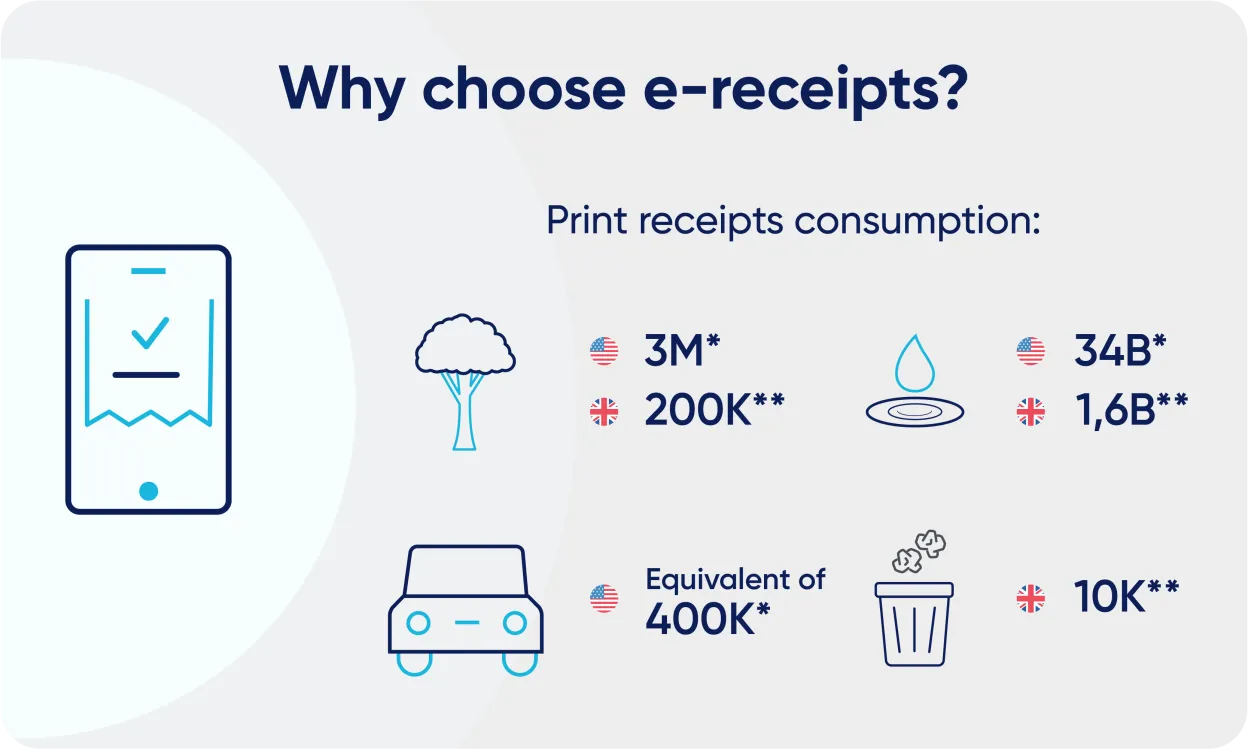Sustainability in the world of payments: Why digital receipts could be the perfect first step

When asking ChatGPT “Why shouldn’t we use paper receipts”, here is the reply:
There are several reasons why we should aim to reduce or eliminate the use of paper receipts:
- Environmental Impact: Paper receipts are often printed on thermal paper, which is not recyclable and contains harmful chemicals such as BPA (Bisphenol A). Moreover, the production of paper receipts requires the use of natural resources such as trees, water, and energy, contributing to deforestation and climate change. (…)
- Health Concerns: The chemicals found in thermal paper receipts can be harmful to human health. BPA, for example, has been linked to developmental problems, cancer, and other health issues.
- Convenience: Paper receipts are often easily lost or damaged, making them an unreliable record of purchases. Additionally, paper receipts can clutter wallets and create unnecessary waste.
- Digital Alternatives: With the rise of digital technology, there are many alternatives to paper receipts. For example, electronic receipts can be sent to a customer's email or stored on a mobile app, providing a convenient and sustainable option for keeping track of purchases.
Overall, reducing or eliminating the use of paper receipts can benefit both the environment and human health, while also providing a more convenient and reliable alternative.
This analysis is an interesting starting point, but to come up with a more solid argument for making such a drastic change in the payments industry we need to look a little deeper.
Let’s fact-check this and look at a little more detail:
Environmental impact:
- According to a study named “Skip the Slip” from 2020, led by GreenAmerica, every year in the US, receipt use consumes over 3 million trees and nearly 9 billion gallons of water (34 billion litres). Production and disposal of receipt paper generates unnecessary waste and emits the carbon equivalent of over 400,000 cars on the road.
- According to the BeatTheReceipt campaign, around 200,000 trees are destroyed to supply the UK with paper receipts each year and 1.6 billion litres of water are needed to produce the thermal paper on which they are printed (which is enough drinking water for almost 1.5 million people for an entire year).
- And finally, over 90% of receipts are lost, damaged or thrown away by consumers, creating more than 10,000 tons of paper waste.
- According to insideretail.com, if Australian retailers all stopped printing receipts for a year, the nation could save approximately 1.5 million trees, 249 billions litres of water, and 4.5 billion litres of oil.

Health concerns:
- The “Skip the Slip” study details that an estimated 93% of paper receipts are coated with Bisphenol-A (BPA) or Bisphenol-S (BPS), endocrine-disruptors which serve as colour-developers to make the text appear on receipts. When we touch receipts, the chemical coating is absorbed into our bodies through the skin on our hands. BPA impacts fetal development and is linked to reproductive impairment, type 2 diabetes, thyroid conditions, and other health concerns. Companies have sought out “non-BPA” paper, but the replacement is commonly BPS, a similar chemical which research indicates has similarly detrimental effects as BPA3.
- According to BeatTheReceipt, more than half of all receipts printed in Europe contain these chemicals (BPA and BPS).
- According to ECHA, the European Chemicals Agency, BPA use in thermal paper has been restricted since 2020. However, companies have commonly used BPS to replace BPA in thermal paper. This is a concern as BPS is also suspected of damaging human reproductive and hormonal systems. German authorities have proposed to restrict the use of BPA and other bisphenols with endocrine-disrupting properties for the environment. The proposal was submitted to ECHA in October 2022.
Since 2020, papers delivered by Ingenico no longer contain neither BPA nor BPS, as a response to the health concerns the use of these chemicals raises.

What are the alternatives to paper receipts?
In this modern technological landscape, there are several digital alternatives today to paper receipts which are becoming more readily available to consumers.
Thanks to Ingenico’s PPaaS digital receipts solution and with the help of our partners' expert solutions, Ingenico’s Android terminals now enable merchants to reduce paper consumption by offering a digital receipts alternative.
- ReceiptHero: Receipts and loyalty in one platform - respecting data privacy. ReceiptHero is on a mission to transform 700 billion transactions into meaningful interactions.
- I hate Receipts, is a solution that does more than receipts services and offers a way to start a conversation with customer, after the POS.
Discover more about our partners ReceiptHero and I Hate Receipts in their own words by watching the interviews.
What about the carbon footprint of paper receipts?
The carbon footprint metric is defined as the total amount of greenhouse gases produced to support human activities directly and indirectly. And it goes without saying that paper receipts do generate carbon emissions.
According to our estimation, one single paper receipt would produce an average of less than 2 grams of CO2 per receipt. This estimation has been calculated based on the average length of paper receipts which is 9cm, and includes both estimations of upstream and downstream transportation and distribution carbon emissions.
Based on this, we devised three digital receipts scenarios to compare carbon emissions: a text on a smartphone coupled with a webpage, an email with a PDF attached, and a QR code using a smartphone. By adopting digital receipts solutions using one of these scenarios, banks, acquirers, and merchants would reduce receipts carbon footprint by at least 3 times compared to paper receipts emissions. Even though digital alternatives still produce carbon emissions, it’s not only an improvement, but an alternative worth considering.
In addition, according to our estimation, merchants who choose the digital receipts solution could save about 80€ per year in paper costs (based on 50 transactions a day).
The French use case: When regulations push towards the end of paper receipts
With concerns about climate change and environmental degradation reaching new heights, nations across the globe are proactively seeking ways to mitigate their ecological impact. One significant source of waste is paper receipts, which are often used for short-term purposes and quickly discarded. In recent years, these seemingly harmless pieces of paper have contributed significantly to deforestation, greenhouse gas emissions, and pollution due to the chemicals involved in their production.
- France's Vision for Sustainable Receipts
In response to the environmental impact of paper receipts, the French government is set to enforce a transformative law that seeks to minimize waste while empowering consumers and businesses to make eco-conscious choices. Starting August 1, 2023, businesses in France will be prohibited from automatically printing paper receipts for transactions. Instead, they will be required to ask customers explicitly whether they desire a physical receipt or if a digital copy would suffice.
- Balancing Business Needs with Environmental Concerns
Unlike some initial reports, the law does not mandate businesses to have a digital receipt alternative, leaving the choice of providing digital receipts to the discretion of individual merchants. While this may seem like a less aggressive approach, it allows businesses to adapt at their own pace, considering their operational capabilities and the preferences of their clientele.
- Environmental Impact and Benefits
By reducing the default printing of paper receipts, France aims to achieve multiple environmental benefits. The most immediate impact will be a decrease in paper waste, leading to a reduction in deforestation and the associated carbon emissions from logging and paper production. Additionally, the law will alleviate the burden on waste management facilities, reducing the volume of paper receipts in landfills and incinerators.
Furthermore, the measure is expected to conserve water and energy resources utilized in paper production processes, contributing to a more sustainable use of these vital resources.
- A Step Towards a Greener Future
France's decision to tackle the issue of paper receipts is undoubtedly a significant step towards a greener future. By nudging consumers and businesses towards more sustainable choices, the law reinforces the message that environmental responsibility is a shared obligation. While challenges lie ahead, the potential positive impact on the environment is undeniable.
The success of France's endeavour will not only be measured by the reduction in paper waste but also by the collective change in mindset towards more sustainable practices. Anticipation is building around how this law will unfold, and whether this step will inspire other nations to adopt similar measures as part of the ongoing battle against climate change.
In conclusion, the use of paper receipts has significant environmental and health impacts, and it is high time to consider more sustainable alternatives. With the rise of digital technology there are many options available, and businesses can play a crucial role in reducing paper waste by offering digital receipts to customers. By making this small but meaningful change, we can bring a positive impact on the environment, our health, and our communities. Let's work together to create a more sustainable future!
Hey! Don’t leave yet!
Are you interested in taking this step towards a more sustainable future?
Check Ingenico’s PPaaS digital receipts solution right here.









